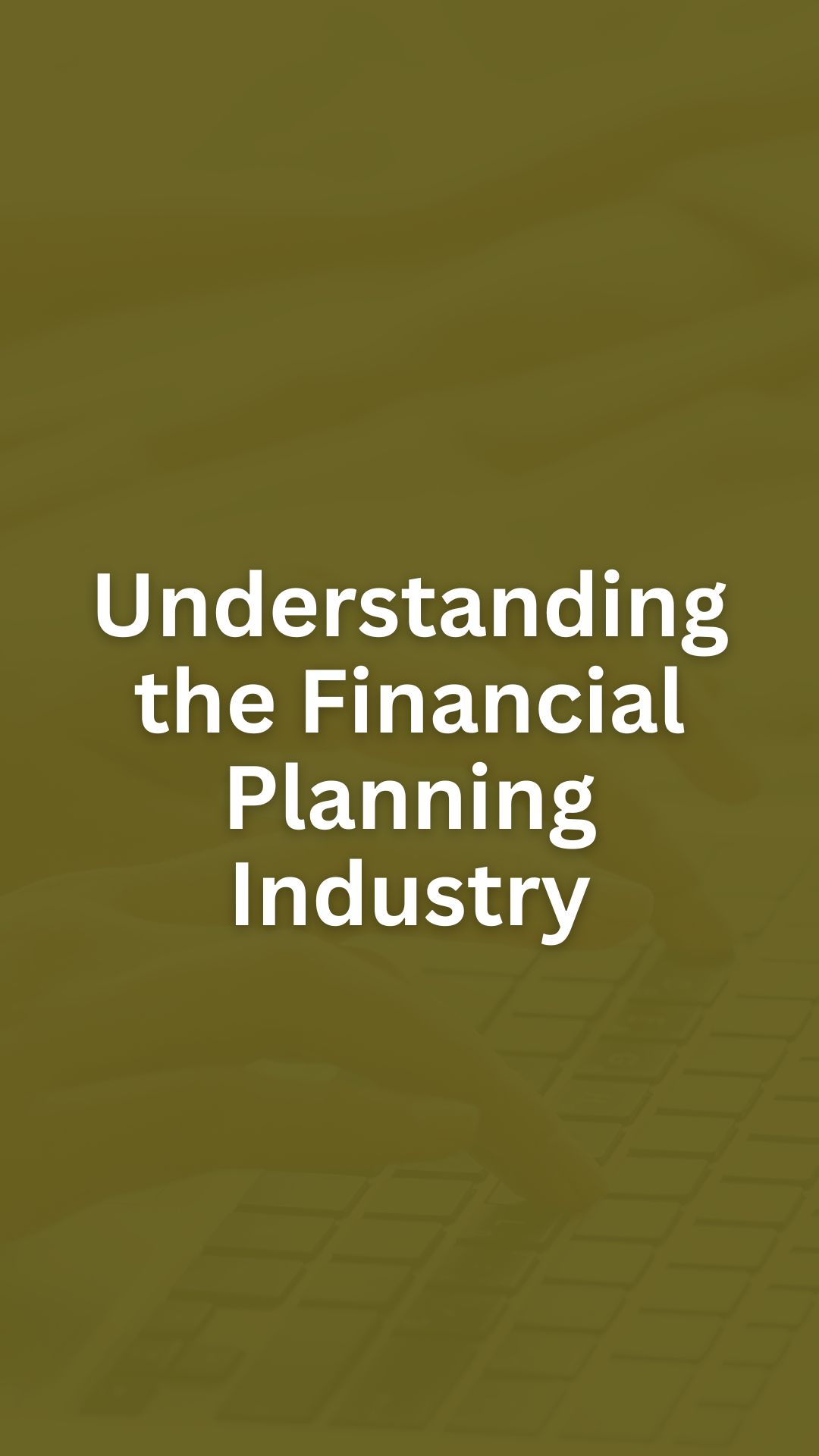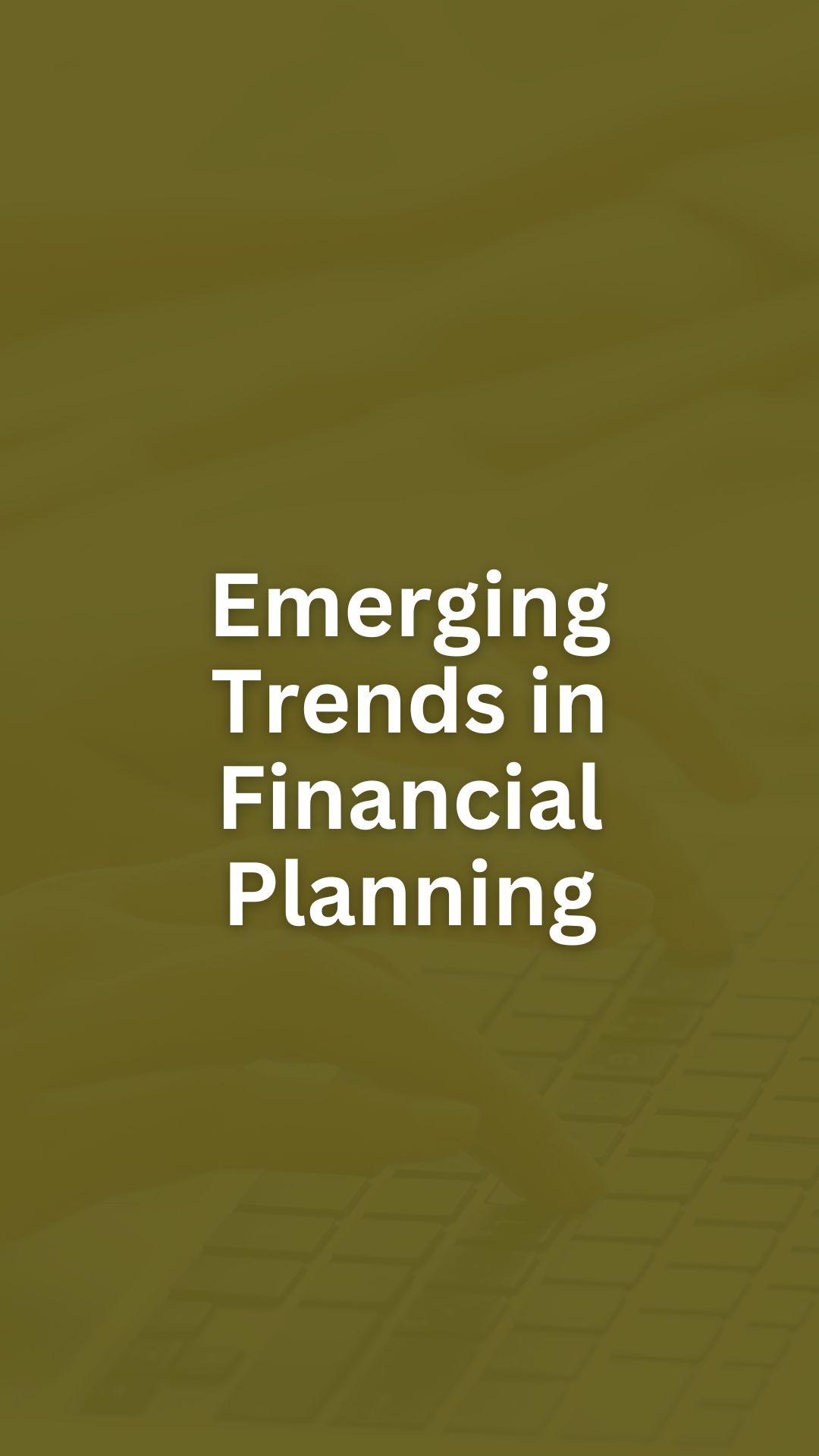Thinking about starting a career in financial planning? You’re in the right place!
Financial planning is a rewarding career path with great opportunities. Becoming a financial planner lets you help people achieve their financial goals while also building a successful career for yourself.
To kickstart your journey, you need to understand the basic steps. This includes getting the right education, earning certifications, and gaining practical experience.
You don’t need any previous experience in finance to get started—just a willingness to learn and grow.
Networking is also key. Connecting with other professionals and joining industry groups can open many doors.
The path to becoming a financial planner is clear: educate yourself, get certified, and start building your network.
Ready to dive in? Let’s get started!

Understanding the Financial Planning Industry
The financial planning industry is vast and dynamic. You will guide people to make smart money decisions. Your role will include advising on investments, retirement, taxes, and more.
Key Areas:
- Investment Planning: Helping clients grow their money.
- Retirement Planning: Ensuring clients have enough for their golden years.
- Tax Planning: Finding ways to reduce tax liabilities.
A financial planner needs to understand various financial products and services. These include stocks, bonds, mutual funds, and insurance policies. You help clients make informed choices among these options.
Essential Skills:
- Analytical Skills: Assess financial data.
- Communication: Explain complex information simply.
- Problem-Solving: Find solutions tailored to client needs.
Required Qualifications:
- A bachelor’s degree in finance, economics, or a related field.
- Certification such as CFP (Certified Financial Planner) enhances credibility.
- Practical experience through internships or entry-level positions.
The financial planning industry offers numerous opportunities. You could work in banks, investment firms, insurance companies, or even start your own practice.
Benefits:
- Job Satisfaction: Helping others reach their financial goals.
- Flexibility: Potential to set your own hours.
- Income Potential: Earnings can grow with experience and client base.
You will find that keeping updated with market trends and continuing education is vital. The industry evolves constantly, so staying informed is key to success.

Education Requirements
To start a career in financial planning, you need a strong educational background. Focus on getting a degree and desired certifications to stand out.
Bachelor’s Degree
A bachelor’s degree in finance, accounting, economics, or business is important. Courses in these fields provide you with essential skills. Subjects like investments, risk management, and tax planning are key.
You might also take classes in statistics, business law, and financial analysis. These will help you understand the broader financial landscape.
Some colleges offer degrees specifically in financial planning. Look for programs certified by the Certified Financial Planner (CFP) Board. This can make your path smoother.
Certifications
After your degree, certifications boost your career. The Certified Financial Planner (CFP) certification is popular.
To become a CFP, you must complete courses, pass an exam, and gain experience.
Other useful certifications include the Chartered Financial Analyst (CFA) and Certified Investment Management Analyst (CIMA). These require exams and show your expertise. They can give you an edge in the job market.
Continuing education and online courses can help keep you up-to-date.

Skill Development
In financial planning, developing specific skills is crucial. You need strong analytical abilities, clear communication talents, and technical know-how. Mastering these areas will help you excel and provide the best service to your clients.
Analytical Skills
Analyzing financial data is a big part of being a financial planner. You must evaluate clients’ financial situations including their income, investments, and debts.
You need to identify trends and spot problems early. This means understanding spreadsheets, charts, and graphs.
Strong analytical skills help you give advice that fits your clients’ needs and goals.
Problem-solving is key too. Clients may face financial challenges, and you must find solutions that work for them. Think outside the box and stay updated with market trends.
Communication Skills
Clear communication builds trust with your clients. You need to explain complex financial concepts in simple terms.
Clients should feel comfortable asking questions and discussing their concerns.
Listening is just as important. Understand what your clients want and need. This helps you create plans that are truly helpful for them.
Presentation skills matter too. You might have to present financial plans or reports. Being clear and persuasive ensures your clients understand and appreciate your advice.
Technical Proficiency
Being skilled with financial software and tools is vital. Familiarize yourself with software like Excel, financial planning software, and accounting programs. These tools help you create accurate and detailed plans.
Stay updated with new technologies. Many financial planners use apps and online portals to manage their clients’ finances. Being tech-savvy can make your work more efficient and impressive.
Having a good grasp of regulations and laws is important too. This ensures that the advice you give is compliant and safe for your clients.

Gaining Experience
Starting a career in financial planning requires hands-on experience and practical skills. Two common ways to gain this experience are through internships and entry-level positions.
Internships
Internships are an excellent way to get your foot in the door. They provide real-world experience, helping you understand the day-to-day tasks of a financial planner.
Many internships offer a chance to work directly with experienced professionals, allowing you to learn from their expertise.
Look for internships offered by financial planning firms, banks, or investment companies. These positions often involve tasks like preparing financial reports, conducting market research, and assisting with client meetings.
An internship might last a few months or an entire year, and can sometimes lead to a permanent job.
While internships may be unpaid or offer only a small stipend, the experience and networking opportunities you gain are invaluable. Focus on learning as much as you can and making a positive impression on your colleagues.
Entry-Level Positions
Entry-level positions are another great way to start your career in financial planning. These roles often include job titles like “Junior Financial Planner” or “Financial Planning Assistant.”
In these positions, you will support senior planners by gathering data, preparing financial documents, and handling basic client inquiries.
When applying for entry-level jobs, highlight any relevant skills or coursework from your education. Employers value candidates who have a solid foundation in finance and a willingness to learn.
Some entry-level positions also offer training and mentorship programs to help you develop your expertise.

Networking and Mentorship
Building connections in the financial planning industry is crucial. Networking and finding a mentor can offer you guidance, insights, and opportunities that are invaluable.
Professional Organizations
Join professional organizations related to financial planning. These groups often host events where you can meet other professionals.
Look for local chapters of well-known organizations like the Financial Planning Association (FPA) or the Certified Financial Planner Board of Standards (CFP Board).
Attending meetings, webinars, and conferences helps you stay updated on industry trends. Volunteer roles within these organizations can also increase your visibility and allow you to gain experience.
Be proactive in attending workshops and panel discussions where you can learn and meet experts.
Don’t forget to use online platforms. LinkedIn, for instance, offers numerous groups and forums for financial planners.
Engaging in online discussions can help you build an international network. It’s all about who you know and how you connect with them.
Finding a Mentor
A mentor can be a game-changer in your career. Look for someone with significant experience in financial planning.
You can find mentors through your network, professional organizations, or online communities.
Reach out to potential mentors with a clear message. Explain why you admire their career and how you think they can help you. Show your dedication and willingness to learn.
Mentors provide guidance, share their experiences, and offer advice on career decisions.
Remember, mentorship can be formal or informal. Regular monthly meetings or occasional catch-ups can both be valuable.
Be sure to respect their time and come prepared with questions. A good mentor not only guides you but also challenges you to think critically and grow in your role.

Building Your Client Base
In financial planning, attracting and maintaining clients is crucial for success. Focusing on effective marketing strategies and excellent client relationship management will help you grow and sustain your business.
Marketing Strategies
Utilize social media platforms like LinkedIn, Facebook, and Twitter to connect with potential clients.
Share valuable content, such as blog posts or financial tips, to show your expertise and engage your audience. Regular posting keeps your presence active and visible.
Networking is another powerful tool. Attend local events, workshops, and seminars to meet potential clients and industry peers.
Forming these connections can lead to referrals and new business opportunities. Don’t forget to bring business cards and follow up with new contacts.
Creating a professional website is essential. Include detailed descriptions of your services, client testimonials, and a blog.
This not only helps with your online presence but also builds trust with prospective clients. Make sure your site is mobile-friendly and easy to navigate.
Email marketing can keep you in touch with clients and prospects. Send regular newsletters with financial insights, updates, and promotions.
This keeps your services fresh in their minds and positions you as an expert in the field.
Client Relationship Management
Focus on building trust and transparency with your clients. Clearly explain financial plans and avoid jargon. This ensures clients understand your recommendations and feel confident in your services.
Regular communication is key. Schedule periodic check-ins to review their financial goals and progress.
Use these meetings to address any questions or concerns, and adjust plans as needed. This shows you are committed to their long-term success.
Offer personalized services tailored to each client’s unique needs and circumstances. This personal touch can set you apart from competitors and foster client loyalty.
Use client data to provide relevant advice and demonstrate your dedication to their financial well-being.
Keep detailed records and use CRM tools to manage client information and interactions.
This can improve efficiency and ensure that no detail is overlooked. Staying organized shows clients that you are professional and meticulous.
Remember to ask clients for feedback and use it to improve your services. Positive feedback can also be used in testimonials to attract new clients.

Regulatory Compliance and Certification
To start a career in financial planning, you need to meet specific regulatory standards and obtain certification. Learning about licensing and continuing education helps you stay competent and compliant.
Licensing Requirements
Licensing is crucial for a financial planner. You often need to pass exams like the Series 7 or Series 65.
These exams test your knowledge of securities and investment principles. In the United States, you register with FINRA (Financial Industry Regulatory Authority) or your state’s regulatory authority.
Here are some key points:
- Series 7 Exam: Covers various investment types and client management.
- Series 65 Exam: Focuses on laws, regulations, ethics, and financial principles.
- Additional Requirements: Some states may have further criteria like background checks.
Meeting these requirements allows you to legally advise clients on investments.
Continuing Education
Continuing education keeps your skills up to date. It’s mandatory to renew your certification and stay informed about industry changes.
Most financial planners need to complete a certain number of hours each year.
Key points include:
- Regular Updates: Courses on tax laws, market trends, and new financial products.
- Professional Development Credits (PDCs): Often required to maintain certification.
- Workshops and Seminars: Good opportunities for networking and learning.
Staying current with your education ensures that you provide the best advice to your clients.

Career Advancement Opportunities
As you grow in a financial planning career, you can choose to specialize or move into management roles, taking on more responsibilities and earning higher salaries.
Specializations
Specializing lets you focus on a specific area of financial planning. You could become an expert in retirement planning, tax planning, or estate planning.
Specializing makes you more valuable to clients and employers.
Earning certifications like the Certified Financial Planner (CFP) or Chartered Financial Analyst (CFA) can help you specialize.
These credentials show you have advanced knowledge. Platforms like the Financial Planning Association (FPA) offer resources to help you get certified.
Specializing may also lead to higher pay and more job opportunities. Clients often seek planners with expertise in their unique financial needs.
Management Roles
Advancing to management in financial planning means taking on leadership roles. You might become a team leader, managing a group of planners.
This includes training new hires and overseeing client accounts.
To get into management, you need strong leadership skills and experience. Pursuing an MBA or other leadership training can be helpful.
You also need to show success in handling complex financial planning tasks.
Management roles often come with higher salaries and bonuses. There’s also the opportunity to influence company policy and strategy, and lead large projects. Becoming a manager can be a great way to shape the future of your firm.

Understanding Compensation Models
Choosing the right compensation model is important in financial planning. It affects your income, client relationships, and job satisfaction.
Salary vs. Commission
In a salary-based model, you receive a fixed income. This guarantees financial stability and can help you focus on providing the best service to clients.
You’re not pressured to make sales just to earn more.
A commission-based model ties your income to sales performance. You earn a percentage of the products you sell or the investments you manage.
This can lead to higher earnings if you are good at selling but has less stable income.
Pros:
- Salary: Stability, predictable income.
- Commission: Potential for high earnings, rewards high performance.
Cons:
- Salary: Limited earning potential.
- Commission: Income can be unpredictable.
Fee-Based Planning
Fee-based planners charge a fee for their services. This can be a flat fee, an hourly rate, or a percentage of the assets managed.
This approach can align your interests with those of your clients.
Clients may prefer fee-based planning because fees are transparent and based on the service, not product sales.
This model can build trust and long-term client relationships.
Types of Fees:
- Flat Fee: A set charge for specific services.
- Hourly Rate: Payment based on time spent.
- Percentage of Assets: Charges based on a percentage of the client’s assets managed.
Pros:
- Builds trust.
- Transparent fees.
- No pressure to sell specific products.
Cons:
- Requires clear communication.
- Fee structure must be justified.

Emerging Trends in Financial Planning
Financial planning is constantly advancing with new technologies and sustainability trends. Staying updated will help you succeed in this field.
Technology Integration
The use of technology is transforming financial planning.
Tools like robo-advisors and artificial intelligence (AI) provide faster analysis and personalized advice.
Traditional methods are being paired with software that can manage portfolios, track spending, and even predict market trends.
With cloud computing, you can access financial data from anywhere, making it easier to work remotely and collaborate with clients.
Blockchain technology offers increased security for transactions and data storage, adding another layer of reliability.
Investing in tech skills will give you a major advantage.
Courses on financial software, AI, and blockchain are highly recommended.
These technologies can streamline your workflow and improve client satisfaction.
Sustainable Investing
Sustainable investing is gaining popularity as more people focus on ethical and green investments.
This involves choosing stocks, bonds, or funds that meet environmental, social, and governance (ESG) criteria.
Clients are now more interested in how their investments impact the world.
Understanding ESG factors helps you guide them toward sustainable choices.
Many companies are now labeling their funds as “green” to attract environmentally conscious investors.
Stay updated on regulations and standards related to sustainable investing.
This knowledge will help you offer up-to-date advice.
Highlighting sustainability can attract a growing client base focused on making a positive impact while achieving financial goals.

Setting Long-Term Goals
Setting long-term goals is important for a successful career in financial planning. Long-term goals give you a clear roadmap and keep you motivated.
Steps to Set Long-Term Goals:
- Identify Your Vision: Imagine where you want to be in 5, 10, or even 20 years.
- Break Down Goals: Divide your main goal into smaller, manageable parts.
- Set Specific Targets: Make your goals clear and specific. For example, “Become a certified financial planner in 5 years.”
- Create a Timeline: Set deadlines for each part of your goal.
Examples of Long-Term Goals:
- Earn a certification like CFP®.
- Build a client base of 50+ clients.
- Create a detailed financial plan for dozens of clients.
- Start your own financial planning firm.
Why Long-Term Goals Matter:
- Stay Focused: Keeps your career on track.
- Measure Progress: Helps you see how far you’ve come.
- Increase Motivation: Keeps you motivated during tough times.

Frequently Asked Questions
Starting a career in financial planning can be a thrilling and rewarding journey. Below are the answers to some common questions that many people have when considering this path.
What steps should I take to become a financial advisor at 40?
It’s never too late to start. Focus on gaining relevant education, such as financial planning courses or certifications.
Network with professionals in the field. Consider internships or entry-level positions to gain experience.
What are the educational requirements to become a financial advisor?
Typically, you need a bachelor’s degree in finance, economics, or a related field. Some positions might require specific coursework or certifications.
Continuing education is also important to stay updated.
Can I become a financial advisor without any prior experience?
Yes, you can. Entry-level positions may not require extensive experience.
Pursuing internships, training programs, or mentorship opportunities can help. Networking and continuous learning are key.
What’s the best degree to pursue for a career in financial planning?
A degree in finance or economics is often preferred. Some colleges offer specific programs in financial planning.
Additional coursework in business, accounting, or investment management can be beneficial as well.
How long does it typically take to achieve a Certified Financial Planner (CFP) designation?
It usually takes several years. You need a combination of education, experience, and passing the CFP exam.
Most candidates need at least three years of work experience in the field before they can qualify.
Is pursuing a career in financial planning rewarding and profitable?
Many financial advisors find their careers rewarding. Helping clients achieve financial goals can be fulfilling.
Financial planning can also be profitable. You can potentially earn substantial amounts as you gain experience and build your client base.